|
BASTA!
End The Embargo of US Trade with Cuba.
I Would Love To Visit Cuba Legally!
Joke:
Why do Cuban-Americans like Miami so much?
Answer:
Because it is so close to the United States.
Castro Is Ill. Cubans in Miami Go Wild

(By Al Diaz -- Miami Herald)
Cuban Exiles
in Miami: Where is their loyalty? http://64.233.167.104/search?q=cache:fpw3sfB7IRoJ:www.clas.berkeley.edu:7001/Events/fall2003/11-20-03-stepick/index.html+Miami+Cubans&hl=en&ct=clnk&cd=13&gl=us&client=firefox-a
The large community of Cuba exiles in Southern Florida have political influence
in the US far past their size due to their location in a key swing state and their
apparent
cohesiveness in favor ways to pressure Castro, most notably maintaining the embargo on
trade with Cuba. That unity is breaking up.
See Cuban
Exiles on the Trade Embargo: Interviews
This Is The Cuba
That Americans Never Get To See.
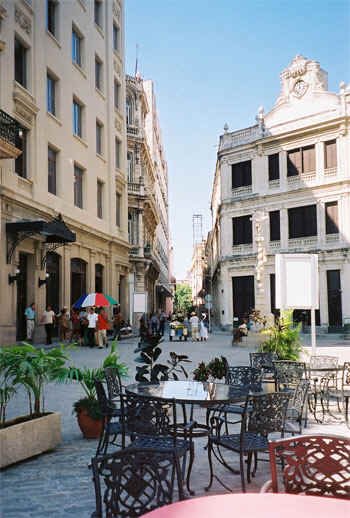
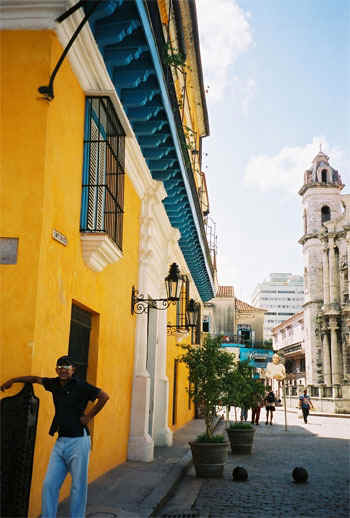
Outdoor café in Old Havana (photo by Linda Garrett)
UNESCO provided funding for
the restoration of Old Town
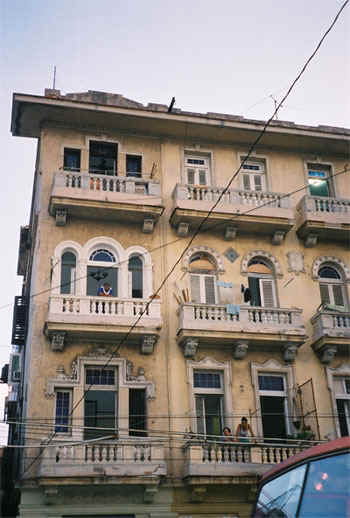
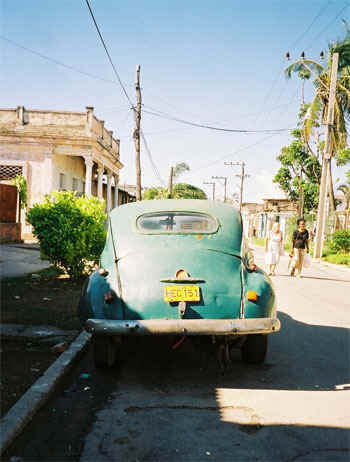
( Havana apartment building (photo by Linda Garrett )
Classic cars dot the landscape
(photo by Linda Garrett)
===================================================================================
 Why Is Cuba Still Off Limits
to Why Is Cuba Still Off Limits
to
American Tourists, Investment,
Commerce and Ideas?
Bush's Answer: "Trade with
Cuba does not benefit the people of Cuba. It is used
to prop up a repressive regime". The 46-year old trade embargo is a
"vital part of America's
policy toward Cuba."
The
Real Answer: Cuban Exiles Shape American Foreign Policy
In a nutshell, the answer is our foreign policy towards Cuba is dominated by
minority special
interest politics and, apparently, a ridiculous fear of Cuban socialism spreading
to America in the
arena of health care. The central truth is that American politicians seem deathly
afraid of the
Cuban émigré population in pivotal Florida. American politicians, other than Jimmy
Carter,
refuse to call
for the end of the embargo. Cuba-American relations mean little to most
Americans, but
they mean a lot to the anti-Castro Cubans in Florida. So, an American politician
gains nothing by
calling for the end to this the foolish 47-year old embargo. And he loses votes
from the very
vocal Cuban Americans in Miami. Both Democratic and Republican Congressmen
and Presidents
have failed America, at large, in the matter of American relations to Cuba. The
anti-Castro
Cubans in Miami are more of a menace to America than they are to Castro.
August 29, 2007
"CUBAN EXILE TERRORIST: 1500 guns, Live Grenade, 35
Machine Guns and More!"
In April 2006, police entered the home of
Cuban exile, Robert Ferro.
They found 1500 guns, 35 machine guns, 130 silencers, a live hand
grenade, a rocket launcher tube and 89,000 rounds of ammunition.
What was he doing with such an arms cache?...
For more than 40 years, Miami-based, anti-Cuba terrorist organizations
have launched repeated terrorist actions against Cuba and its people,
with the knowledge and support of the FBI and CIA. Upwards of 3,000
Cubans have died as a result of these terrorists’ attacks.
( http://hcvanalysis.wordpress.com/2007/08/29/cuban-exile-terrorist-1500-guns-live-grenade-35-machine-guns-and-more/
)
How Important is the Cuban exile
community to George Bush?
"It is
very important, both electorally and financially. As I mention in my article, Karl Rove,
the President’s chief political strategist, recently described Florida as
“ground zero” for
the 2004 elections. If you look at the math, Florida’s electoral votes could once
again
be decisive. That makes the Cuban exiles a pretty crucial constituency. The Florida Cubans
gave Bush two hundred and fifty thousand more votes than they gave Gore—in a contest
that was decided, of course, by five hundred and thirty-seven votes. The exiles are also
big
political contributors, mainly to the Republican Party. The question this year is whether
Cuban-Americans are still so solidly in the Bush camp...
"There have been many intersections between George H. W. Bush’s career and the
Cuban-exile epic, and there are plenty of theories that try to tie them all together.
These
narratives tend to place Bush in the thick of the Bay of Pigs invasion (he had an offshore
oil-drilling rig near Cuba), the J.F.K. assassination (Cuban exiles were often accused of
involvement), Watergate (several of the plumbers were Cuban), and the Iran-Contra
scandal (not really a stretch). And, of course, the roles played by Jeb and the Cuban
exiles
in ultimately delivering Florida to George W. in 2000"
(Source: http://www.newyorker.com/archive/2004/03/15/040315on_onlineonly01
)
The Embargo Has Been A Complete Failure.
It did not bring the overthrow of Castro! Cuba is one of the few remaining countries
still having a
one-party Marxist government. The Embargo denies the US any influence.
It is
a slegehammer approach.
It is counterproductive to greater human rights in Cuba. It is an
all-or-nothing policy.
A 1996 US law requires the embargo to be continued until there is a
new Cuban government
that "does not include Fidel Castro or Raul Castro". Surely a
more calibrated US
trade policy towards Cuba could better bring some releases of political prisoners
and freer expression
there. Sadly, the Embargo hurts the Cuba people, but strengthens Castro.
It gives him
justification for tighter political controls to defend "Cuban socialism"against
Yankee imperialism;
America is easiliy portrayed as an uncaring bully and menace.
Lastly, it all too
clear that the embargo has foolishly closed off a very good market for
American goods.
At long last, a few US corporations are trying to end the embargo.
But, American citizens, by themselves, have no effect on ending this policy. If they
do travel to Cuba, they are
subject to arrest and fine for "aiding the enemy". Freedom for
Americans to travel to Cuba
would surely help break down cold war stereotypes. There's
little question that most
Amercian tourist and agriculture businesses would love to have
the foolishness of this
Embergo be ended.
Much of the rest of the world is already traveling to and trading with Cuba. Why
should they
be allowed to grow extensive
trade relationships with Cuba, when Americans, only 90 miles away, cannot?
Cuban music is great, too.
Canadians view this advertisement to come to Cuba.
http://www.gocuba.ca/en/videos.asp Cuban
Tourist Board in Cuba.

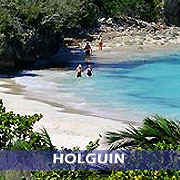 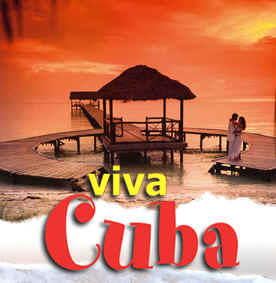
"While we grouse, the world sells. Italian telecomm, French hotels,
and Korean automakers
are more than happy to
trade with an island 90 miles off our shores. Of course, Cuba is not a
huge market: The island
is the size of Pennsylvania, but its population is only 11 million and its
G.D.P. a mere $46
billion. By comparison, Vietnam, the last Communist country with which we
ended a dubious
embargo, is 85 million strong, with a G.D.P. of $262 billion."
(Source: http://www.portfolio.com/views/columns/2007/11/19/Cuba-Embargo-Reasons-to-End
)
It's not easy these days. But the Cuban Embargo makes America look even more to be
a stupid, stubborn
bully. Each year, Cuba asks the UN for a vote of condemnation of the
embargo. And each
year the vote is something like, 183 to 4! The US position is usually
backed by Israel and
either Palua and the Marshall Isalnds or Romania and Uzbekhistan.!
Pro-Embargo Cuban émigrés counter this by saying:
with gaining the
acceptance of Cuba's upper classes, who had denied him membership into their
exclusive social clubs. Increasingly, his energies were devoted to amassing an even
greater fortune. Batista
opened Havana to large scale gambling, announcing that his government would match, dollar
for dollar,
any hotel investment over $1 million, which would include a casino license. American
mobster Meyer Lansky
placed himself at the center of Cuba's gambling operation. At the same time, Batista
sponsored massive
construction projects -- the Havana-Varadero highway, the Rancho Boyeros airport, train
lines, an underwater
tunnel. Brutal and Unpopular As he delayed plans to step down from
office, Batista faced
growing
opposition, and eventually, a popular challenge. In the wake of Fidel Castro's Moncada assault,
in 1953,
Batista suspended constitutional guarantees and increasingly relied on police tactics in
an attempt to frighten the
population through open displays of brutality. Though he made some political concessions
between 1954 and
1956
-- lifting press censorship, releasing political prisoners (including Fidel Castro and his
brother Raul),
allowing exiles to return -- his unpopularity continued to grow. Instability
As popular unrest in Cuba intensified,
Batista's police proved adept at torturing and killing young men in the cities. But his
army proved singularly inept
against Fidel Castro's rebels, who were based in the mountains.Faced with Batista's
military ineptness and growing unpopularity, the United States began to seek an
alternative to Batista and to
Fidel
Castro. But Batista was determined to hold on. On December 11, 1958, U.S. ambassador Earl
Smith
visited Batista at his lavish hacienda, Kuquines. There he informed Batista the United
States could no
longer support his regime. Batista asked if he could go to Daytona Beach, where he had a
house. The
ambassador said no, and suggested instead that he seek exile in Spain. Flight
On New Year's Eve 1958,
Fulgencio Batista left Cuba before the break of dawn, with one hundred and eighty of his
closest associates,
having amassed a fortune of as much as to $300 million. Batista lived the rest of his life
in splendor in Spain
and
in Portugal." ( http://www.pbs.org/wgbh/amex/castro/peopleevents/p_batista.html
)
"Following the coup, Colonel Castillo Armas
became the new president. the U. S. Ambassador furnished Armas with lists of radical
opponents to
be eliminated, and the bloodletting promptly began. Under Armas, thousands were arrested
and many
were tortured and killed. A "killing
field" in the Americas: U. S. policy in Guatemala The coup unleashed
one of the most brutal military regimes in the hemisphere. Some 140,000 people have been
killed and
another 45,000 disappeared in a U.S. backed scorched earth campaign to wipe out
dissidents, rebels
and activists for peace and social justice in Guatemala. The abuses by the Guatemalan
military and
its death squads were so horrific that even Amnesty International reported that they
"strained credulity."
( http://www.geocities.com/~virtualtruth/chiquita.htm
)Castro's anti-Americanism grew in part from the Eisenhower
Administration's
support for the repressive Batista regime. The US backed him because he was willing
fervently
to protect American business interests very well in Cuba. "Anti-Communism"
to both Batista and the
Eisenhower Administration meant jailing those who advocated an end to the extremely
unequal distribution of land and wealth in Cuba. Fidel, himself, "came of age
in a remote region
of Cuba dominated by two sugar mills, the Preston and the Boston, owned by the United
Fruit
Company, a symbol of American dominance in Latin America. His father, Angel Castro, had
come to Cuba to fight against the U.S. in the Spanish-American
War. After Spain's defeat, Angel
remained on the island and made a fortune growing sugar cane for the Americans... It was
the 1940s,
and the experience of the Spanish Civil War was still fresh. Spanish Nationalists under
Francisco
Franco had identified with the Fascists, and anti-Americanism ran high within their ranks.
Castro's
Jesuit teachers imbued the young Fidel with the idea of Hispanidad, stressing the
superiority of
Spanish values of honor and pride as opposed to the materialistic values of the
Anglo-Saxon world.
Once he entered the University of Havana, Castro came in contact with the writings of
nationalist
professors who believed Cuba's destiny had been thwarted by the intervention of
the United States.
The intervention of 1898, the Platt Amendment and U.S. economic domination had combined to
strip
Cuba of its independence and national pride. In Castro's belief system, Cuba's political
failure was
America's fault.... In 1948, Fidel Castro married Mirta Díaz Balart, the daughter of a
lawyer for the
United Fruit Company. Castro came to know the exclusive and prosperous world of Banes,
United
Fruit's company town. In Banes, the Americans lived and played separate from Cubans.
Access to
the town beach was controlled by a gate, and only United Fruit employees had the key. Each
time he
crossed that gate, friends at the time recall, Castro became enraged.
( http://www.pbs.org/wgbh/amex/castro/peopleevents/p_castro.html
)"For the thing we should never do in dealing with
revolutionary countries, in which the world
abounds, is to push them behind an iron curtain raised by ourselves. On the contrary, even
when they have been seduced and subverted and are drawn across the line, the right thing
to do
is to keep the way open for their return." ( Walter Lippmann, July 1959 )
1960 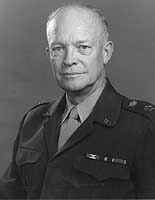 March 17, US President Eisenhower approved a
covert plan to March 17, US President Eisenhower approved a
covert plan to
overthrow Castro. The island's biggest crop, sugar, could no longer be purchased by
the US and
the US embargo on oil and arms shipments to Cuba would be continued from mid-1958...

1961. US Congress authorizes
President to create a total embargo upon all trade, including food
and medicine! The created great havoc in Cuba. Replacement parts for
machinery, buses, cars,
trains and tractors became very scarce.
1962 JFK expands the embargo to all
other countries! Any country that traded with Cuba could
no longer get US Foreign Aid.
1963 JFK prohibited travel to Cuba
and made illegal all commercial transactions with Cuba.
Cuban
Missile Crisis. Forced into the Soviet Camp and fearing another US led invasion, as
had already
occurred at the Bay of Pigs in 1961, Castro got Krushchev to pledge to put missiles in
Cuba that could strike
the
US. This led to a very real threat of a war between the US and Russia. In the
end it was averted.
The
Russian missiles were withdrawn from Cuba and the US pledged not to again invade Cuba and
withdraw its own missiles from Turkey. Seeing how dangerous this plan of isolating
Cuba has become,
JFK
told a French journalist that he was prepared to drop the Embargo. One month after
JFK's
assassination, Robert Kennedy urged Dean Rusk, the Secretary of State to end the travel
ban. LBJ's
man
there rules this out. The travel ban was interrupted only during Carter's Presidency.
1964 "Asked why the US trades with the
Soviet Union but not with Cuba, Secretary of State Dean
Rusk answers that the Soviet government is a "permanent" government,
and the US views Castro as
"temporary."
Terrorists in Miami
by Robert Parry, June 24, 2006
http://www.consortiumnews.com/2006/062406.html
1976 Bush family ties to Cuban exile,
Bosch, who bombed a Cuban airlines plane. Bush Sr. was CIA director.
From TV interview with Exile Orlando
Bosch on Miami’s Channel 41:
“Did you down that plane in 1976?” asked reporter Juan Manuel Cao.
“If I tell you that I was involved, I will be inculpating myself,” Bosch
answered,
"and if I tell you that I did not participate in that action, you would say that I am
lying.
I am therefore not going to answer one thing or the other.”
But when Cao asked Bosch to comment on the civilians who died when the plane
crashed off the coast of Barbados in 1976, Bosch responded, “In a war
such as us
Cubans who love liberty wage against the tyrant [Fidel Castro], you have to down
planes, you have to sink ships, you have to be prepared to attack anything that is within
your reach.”
“But don’t you feel a little bit for those who were killed there, for their
families?” Cao asked.
“Who was on board that plane?” Bosch responded. “Four members of the
Communist Party,
five North Koreans, five Guyanese.” [Officials tallies actually put the Guyanese dead
at 11.]
Bosch added, “Four members of the Communist Party, chico! Who was there?
Our enemies…”
“And the fencers?” Cao asked about Cuba’s amateur fencing team that had
just won gold,
silver and bronze medals at a youth fencing competition in Caracas. “The young people
on board?”
Bosch replied, “I was in Caracas. I saw the young girls on television. There were six
of
them. After the end of the competition, the leader of the six dedicated their triumph to
the tyrant. … She gave a speech filled with praise for the tyrant.
“We had already agreed in Santo Domingo, that everyone who comes from Cuba to
glorify the tyrant had to run the same risks as those men and women that fight alongside
the tyranny.” [The comment about Santo Domingo was an apparent reference to a
strategy meeting by a right-wing terrorist organization, CORU, which took place in the
Dominican Republic in 1976.]
“If you ran into the family members who were killed in that plane, wouldn’t you
think it
difficult?” Cao asked.
“No, because in the end those who were there had to know that they were cooperating
with the tyranny in Cuba,” Bosch answered.
In an article about Bosch’s remarks, lawyer Pertierra said the answers “give us
a glimpse
into the mind of the kind of terrorist that the United States government harbors and
protects
in Miami.”
United Fruit, War Crimes and Terrorism
in Honduras and Guatemala
"It was in Honduras
that the United Fruit and Standard
Fruit companies dominated the
country's key banana export sector and support sectors such as railways. The United Fruit
Company was
nicknamed "The Octopus" for its willingness to involve itself in politics,
sometimes violently. In 1910,
Sam
Zemurray, who
22 years later would take over United Fruit in a hostile bid, hired a
gang of armed toughs from
New Orleans to
help stage a coup in Honduras in order to obtain beneficial treatment from the new
government
for his own banana-trading company, Cuyamel Fruit." ( http://en.wikipedia.org/wiki/Banana_republic
)
Guatemala: 1954 Since President Juan José
Arbenz, a philosopher who was overthrown
in June, 1954, by CIA sponsored forces, Guatemala has had few presidents who were not
generals. The first
one after the resignation of Arbenz, Castillo Armas, countered the reform by Arbenz, and
threw thousands of
peasants off their land. Nine thousand Mayan Indians were
imprisoned and hundreds murdered. A Black List
comprised of 70,000 Arbenz supporters or suspected communists was compiled; eventually
tens of thousands
on the list were exiled or murdered (Inside Central America, Clifford Kraus pp
30-33) This is the beginning of
modern state terrorism in Guatemala. ( http://www.ljcnet.com/guatemala-terrorism.htm
) To see how
paranoid the CIA was at the time, how they considered every peasant protest or worker
strike a sign that
Moscow trained Communists were at work, read books published by Praeger,
especially, the CIA's
Guatemala:
Communism in Guatemala,1944-1954
|
....
1990 "In alliance with conservative
Republicans, Cuban émigrés and the U.S. Congress pass the Mack
Amendment, which prohibits all trade with Cuba by subsidiaries of U.S. companies
located outside the
U.S., and proposes sanctions or cessation of aid to any country that buys sugar or other
products from
Cuba."
February 5. U.S. Congressman Robert Torricelli introduces the Cuban
Democracy Act, and says
the bill is designed to "wreak havoc on the island."
June 15. From an editorial in the NY Times:
"…This misnamed act (the Cuban Democracy Act) is
dubious in theory, cruel in its potential practice and ignoble in its election-year
expediency… An
influential faction of the Cuban American community clamors for sticking it to a wounded
regime…
There is, finally, something indecent about vociferous exiles living safely in Miami
prescribing more
pain for their poorer cousins."
October 15. U.S. Congress passes the Cuban Democracy Act,
which prohibits foreign-based subsidiaries
of U.S. companies from trading with Cuba, travel to Cuba by U.S. citizens, and family
remittances to Cuba.
The law allows private groups to deliver food and medicine to Cuba. (At this time, 70% of
Cuba's trade with
U.S. subsidiary companies was in food and medicine. Many claim the Cuban Democracy Act
is in violation of
international law and United Nations resolutions that food and medicine cannot be used as
weapons in
international conflicts.)
October 23. President Bush signs the Cuban Democracy Act
into law. Congressman Torricelli says
that it will bring down Castro "within weeks." (Note: The breakup of
the USSR and the end of
Soviet subsidies to Cuba have not brought down Castro!)
1996 Clinton signs the Cuban
Liberty and Democratic Solidarity (Libertad) Act (also known as the
Helms-Burton Act) which imposes penalties on foreign companies doing business in
Cuba, permits U.S.
citizens to sue foreign investors who make use of American-owned property seized by the
Cuban government,
and denies entry into the U.S. to such foreign investors.
1998 The Pope
visits Cuba and call for the world to open up to Cuba. In
Boston, Roman Catholic
Cardinal Bernard Law urges US President Bill Clinton to end the 36-year-old embargo.
"It is impossible
to reasonably support the embargo against Cuba while at the same time granting Most
Favored Nation
Status to the People's Republic of China…" says Law.
October. The US Treasury Department investigates two US organizations for traveling to
Cuba without
a license; Global Exchange and Pastors for Peace.
September 11. After returning home from a visit to Cuba, ex world boxing champ Muhammad
Ali
calls for an end to the trade embargo against Cuba.
1999 The coalition of Americans
for Humanitarian Trade With Cuba join the United States
Association of Former Members of Congress to call on the Clinton administration to
end the embargo
on food and medicines to Cuba. "The U.S. embargo on Cuba is the single most
restrictive policy of its
kind. Even Iraq is able to buy food and medicine from U.S. sources," says George
Fernandez, Executive
Director at AHTC. "As a Cuban American, I speak for the vast majority of us who do
not think the U.S.
should be in the business of denying basic sustenance to families and children in
Cuba."
2000 At a meeting of the International
Chamber of Commerce, American businessman and ICC
Vice-President Richard D. McCormic, calls for an end to the US trade
embargo of Cuba. "…
embargoes don't work," said McCormick. "They are counterproductive; they just
hurt the people who
are in the least position to help themselves. I think that after 38 years it is time for
this embargo to be
ended. Unilateral sanctions don't work." (Mr. McCormic serves on the boards of UAL
Corporation
(United Airlines), Wells Fargo and Company, United Technologies Corporation, and Concept
Five|
Technologies.)
2001 In Washington, the Cuba
Policy Foundation releases a poll in which a majority of
Americans
are said to support the idea of doing business with Cuba and allowing
travel to the island.
August 23. Organizers of the Latin Grammy Awards
announce that they will change the location
of this year's event from Miami to Los Angeles fearing violent protests from
anti-communist exiles.
Bush Administration turns down a Cuban offer to compensate Americans for
properties confiscated
by the Revolution 40 years ago.
2002 In Washington, the US House
of Representatives votes 262 to 167 to end the travel ban and
allow the sale of American goods to Cuba. 73 Republicans
vote against the embargo. Rep. Jeff Flake,
the Arizona Republican who led the effort to repeal the travel ban, said: "This is
all about freedom. Our
government shouldn't tell us where to travel and where not to travel."'
2003 U.S. Senators Max
Baucus (D-MT) and Chuck Hagel (R-NE) introduce a bill in
Congress
(United States-Cuba Trade Act of 2003) that seeks to lift the embargo. The US
House of Representatives
approve a bill ending travel restrictions to Cuba for US citizens. The bill, authored by
Jeff Flake, wins by a
vote of 227 to 188. [Like similar bills on the embargo passed by the House, this one will
die in the
Senate.]President George W. Bush establishes the Committee for
Assistance to a Free Cuba,
and further enforces the ban on travel to the island.
=============================================================================
Cuban
Photos from http://www.endtheembargo.com

Cuba's bird-friendly habitat (photo by Arturo Kirkconnell)
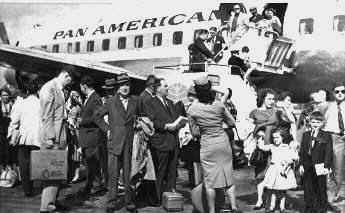
Cuban
bird life (photo by Nils Navarro)
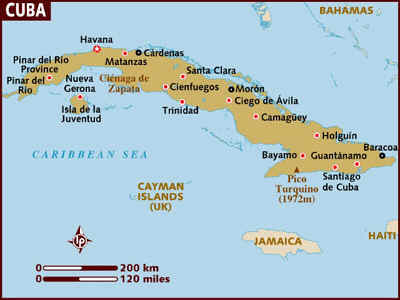
Havana neighborhood (photo by Linda Garrett)

Housing in Pogolotti, Marinao (photo by Linda Garrett)
|
Nationalization and Embargo: A Broadening Spiral.
This section is found at http://answers.google.com/answers/threadview?id=259388
December 9, 1958 - Revolutionary forces led by Fidel Castro take over
the government.
February 13, 1959 - Prime Minister Cardona resigns and Fidel Castro
ascends to the office.
INCIDENTS LEADING TO EMBARGO
April 15, 1959 – Cuban Government adopts the first Agrarian Reform
Law, putting a limit on private land holdings with the state
expropriating the remainder. The government offers compensation to the
former owners based on the property's current tax assessment rate
which has not been adjusted in over 30 years.
January 1960 - Cuba expropriates 70,000 acres of property owned by
U.S. sugar companies which includes 35,000 acres of pasture and forest
land owned by United Fruit, (now United Brands and Chiquita Brands).
United Brands owns an additional 235,000 acres of land in Cuba and
several hundred thousand acres in Guatemala. In 1954 the government of
Guatemala threatened to expropriate all of United Fruit's land
holdings in that country and in an effort to protect U.S. property
interests, the United States orchestrated a successful effort to
overthrow the Arbenz government.
June 6, 1960 - Cuba requests the two US oil refineries, Texaco and
Esso, and one British refinery, Shell, to process a shipment of
Russian crude oil. The companies refuse and on June 28 Cuba orders the
refineries nationalized.
July 5, 1960 - Cuba orders the nationalization of all US businesses
and commercial properties in Cuba.
US FIRES BACK – SUGAR EMBARGO ON CUBA
July 6, 1960 - President Eisenhower, with the authorization of
Congress, cancels Cuba's sugar quota.
CUBA RESPONDS TO SUGER EMBARGO
August 6, 1960 - Cuba nationalizes all U.S. owned industrial and
agrarian enterprises.
September 17, 1960 - Cuba nationalizes all US banks including First
National City Bank of New York, First National Bank of Boston, and
Chase Manhattan Bank.
US STARTS IMPLEMENTING A PARTIAL EMBARGO ON CUBA
October 19, 1960 - The Eisenhower Administration begins employing
unilateral sanctions against Cuba by first imposing a partial embargo,
which becomes a total embargo 16 months later under President John F.
Kennedy.
CUBA RESPONDS AS A TIT FOT TAT ACTION TO US EMBARGO
October 24, 1960 - In response to the U.S. declaration on October 19
that it will impose an embargo, Cuba announces that it will
nationalize all remaining U.S. property on the island.
US TRIES TO END THE GOVERNMENT OF CUBA
April 17, 1961 - The CIA backed Bay of Pigs invasion commences with
1200 Cuban exiles landing on the southwest shore of the island. After
72 hours of fighting the Cuban forces defeat the exiles. The battle
results in 80 exiles being killed and 1122 being captured. Several of
the captured exiles are accused of crimes of brutality while working
for the Batista government, and are soon executed. The remaining
exiles are imprisoned until most are released in December 1962. Many
of the exiles engaged in the fighting had owned property in Cuba prior
to the 1959 Revolution. Their holdings included 914,859 acres of land,
9,666 houses, 70 factories, 5 mines, 2 banks, and 10 sugar mills.
US EXPANDS THE EMBARGO TO ITS LIMITS
February 7, 1962 - President Kennedy expands the Cuban embargo to a
total embargo except for the non-subsidized sale of food and
medicines.
March 23, 1962 - The US extends the trade embargo to include all
imports of all goods made from Cuban materials or containing any Cuban
materials, even if made in other countries.
CUBA MISSLE CRISIS
October 22, 1962 - President Kennedy announces to the world that the
Soviet Union has deployed nuclear missiles in Cuba. This incident
brings the world to the brink of nuclear war. Five days later the
Cuban Missile Crisis is resolved with the Soviet Union agreeing to
remove its missiles from Cuba and the US agreeing not to invade Cuba
and to remove US missiles from Turkey. However the incident results in
cementing a relationship between the Soviet Union and Cuba that lasts
nearly 30 years and injects over $100 billion of Soviet aid and loans
into Cuba.
US ADDS TO EMBARGO
May 5, 1966 - The U.S. expands the embargo as Congress passes the Food
For Peace Act which outlaws food shipments to any country that sells
or ships strategic or non-strategic goods to Cuba except for certain
circumstances in which the President may allow shipments of medical
supplies and non-strategic goods.
|






 Why Is Cuba Still Off Limits
to
Why Is Cuba Still Off Limits
to 





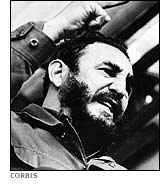
 March 17, US President Eisenhower approved a
covert plan to
March 17, US President Eisenhower approved a
covert plan to 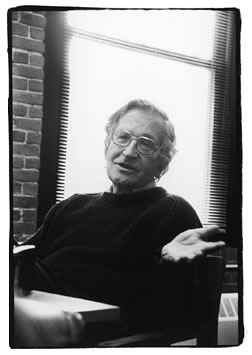 Noam Chomsky
Noam Chomsky 